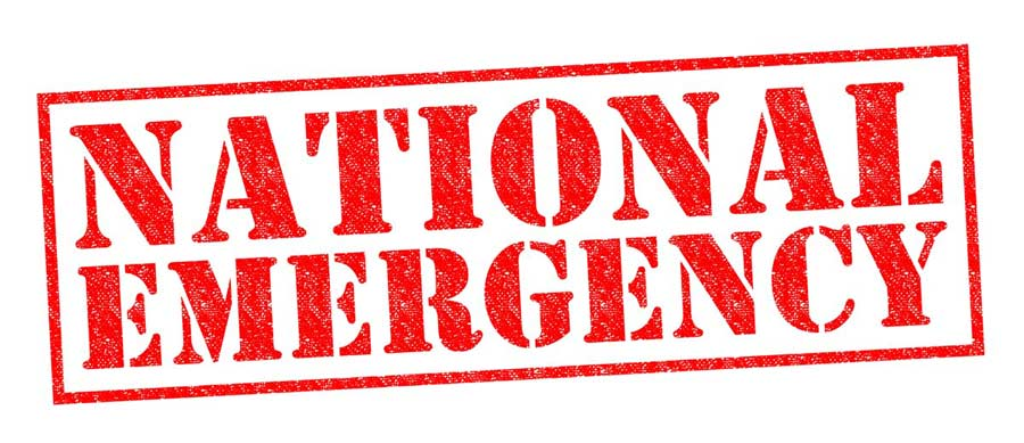Congress Moves Forward With Legislative Challenge To Trump’s ‘National Emergency’
The House of Representatives has begin the process of challenging the President's recent declaration of a 'national emergency' at the southern border.

It was just a week ago that President Trump declared a “national emergency” on the southern border for the purpose of getting funding for his border wall over and above what Congress had authorized for border security in the funding bill passed into law last Thursday. This happened despite the fact that Trump admitted that he didn’t need to declare an emergency but he did so for the purpose of getting the wall funded faster. In that time four separate lawsuits have been filed against the move, including a lawsuit filed by California and fifteen other states, another filed by Texas landowners, a third filed by various environmental groups, and a fourth filed by the ACLU on behalf of the Sierra Club and other groups. Now, the Democratic-controlled House of Representatives has begun the process of challenging the President’s action via legislation:
WASHINGTON — Speaker Nancy Pelosi of California began her push to overturn President Trump’s emergency declaration on Friday, scheduling a House vote for Tuesday on legislation that would end the declaration, a remarkably fast timeline.
With little doubt that Ms. Pelosi can muster the House votes to block the declaration, her goal is to raise pressure on Republicans to defend the prerogative granted to Congress by the Constitution to control federal spending.
“This issue transcends partisan politics,” Ms. Pelosi told reporters on Friday, adding, “It’s about patriotism.” She called on her Republican colleagues to join Democrats in defending Congress’s “exclusive power of the purse.”
Mr. Trump, with his declaration, hopes to divert $3.6 billion from military construction projects to build his promised wall on the southwestern border, effectively going around Congress to secure money that lawmakers have refused to give him.
Multiple lawsuits have already been filed to have the maneuver declared unconstitutional, but the simplest way to block it is for Congress to overturn the declaration through mechanisms set up by the National Emergencies Act of 1976. That will not be easy: Even if a resolution can get through Congress, it will almost certainly need the votes of two-thirds of Congress to overcome an expected presidential veto.
“We prepared for the worst, because the president right now is engaged in the worst,” said Ms. Pelosi, speaking from Laredo, Texas, where she said she plans to tour the southwestern border with other lawmakers. She declined to say if the House would formally support any legal action in court.
More than 220 Democrats and one Republican — Representative Justin Amash of Michigan — have signed on to the resolution of disapproval, which Congress can use to end the emergency status under the National Emergencies Act if the threat has dissolved or if there is concern that the president has used his powers irresponsibly. That is already more than enough to clear the House.
Ms. Pelosi noted that extending an offer to Republicans to join Democrats in co-sponsoring the resolution “is a courtesy.”
“What’s really important is how they will vote when it comes to the floor,” she said. “We’ll see where they come down on that.”
More from Politico:
The House plans to vote Tuesday on legislation to formally block President Donald Trump’s attempt to circumvent Congress to fund his border wall, Speaker Nancy Pelosi announced Friday.
The privileged resolution to stop Trump’s national emergency declaration — which has 226 co-sponsors, including one Republican — is expected to easily pass the House. The Senate will then be forced to vote within 18 days, posing an uncomfortable test of loyalty to Trump for the GOP-controlled chamber.
“The president’s act is lawless and does violence to our Constitution, and therefore, to our democracy,” Pelosi told reporters Friday. “Not only is he disrespecting the legislative branch and the Constitution of the United States, he is dishonoring the office in which he serves.”
Democrats are moving swiftly to take the unprecedented step of voting to terminate Trump’s declaration of a national emergency to build a wall along the southern border with Mexico, which Pelosi described as “frivolous and cavalier.”
Pelosi revealed her strategy from Laredo, Texas, where a group of Democrats are visiting the border in an attempt to dispel the president’s claims that an emergency situation exists.
Next week’s vote will be the first of a two-track approach to force Trump to back off his attempt to siphon money from some Pentagon programs toward a border project.
This, of course, is the beginning of the process permitted by the National Emergencies Act of 1976 allowing Congress to challenge a Presidential declaration of a “national emergency,” and it is to the best of my knowledge the first time in the forty-three year history of the law that Congress is acting to challenge a Presidential action under this law. The procedure from this point forward is fairly straightforward. Assuming that the resolution passes the House of Representatives, which seems assured given that it already has more than a majority of the membership of the House as co-sponsors, the matter will then head to the Senate. Since the law and the rules provide that this would be what is referred to as a “privileged resolution,” the Senate will be required to vote on the matter, will not be subject to amendment, and generally cannot be blocked by the Senate Majority Leader, who ordinarily has broad discretion over what matters make it to the floor of the Senate for a final vote.
At this point, the question will be how many, if any, Republicans join with the Senate’s 47 Democrats and Democratic-affiliated Independents in that initial floor vote. So far, the only Republican on Capitol Hill to indicate their intent to support the Democratic resolution is Congressman Justin Amash of Michigan, who is the closest thing to a libertarian that we currently have on Capitol Hill,who is currently the only Republican co-sponsor of the resolution In the Senate, all it would take for the resolution to pass is four Republicans willing to cross the aisle at which point there would be 51 votes in favor of the resolution. The process doesn’t end there, though. If the bill passes the House and Senate it goes to the President, who will most likely veto it. Because of this, the important questions will be how many Republicans might be willing to join Democrats in overriding a veto. In the House, it would take 55 Republicans to get to this 2/3 majority to override. In the Senate, it would take 20 Republicans. That seems exceedingly unlikely. Nonetheless, if the resolution passes both the House and Senate that will at least send a message that some part of Congress is willing to stand up against the President’s unconstitutional, illegal power grab.





Pelosi has been dishing out the smack-down…pointing out thet $2B of Pentagon drug fighting money that Dennison wants to tap, has already been spent.
Maybe we’ll get lucky, and the GOP side of the Senate will experience an outbreak of sanity.
Since the Supreme Court declared simple majority legislative vetos unconstitutional in INS v. Chadha 35 years ago, it’s hard to see how this congressional activity has any real weight behind it other than the political posturing. If they have 2/3s of both houses, why don’t they repeal the National Emergencies Act? It’s an affront anyway.
@Kathy: a few segments of wall are going to be a small price to pay for the Utopian Socialist States of America, when President Hickenlooper transforms every aspect of our country into a paradise for the workers, through National Emergency declarations.
Do you think Congress is going to approve of FEMA re-education camps for conservatives?
@Gustopher:
What makes you think Congress will be consulted?
@Dave Schuler: Since when did the National Emergencies Act trump the Constitution? (serious question, was it ever constitutional?)
@Concerned Citizen: Keep telling yourself that building the wall thing. It’ll be a comfort when you’re as old as Trump and muttering “we were building a wall and everything” to yourself.